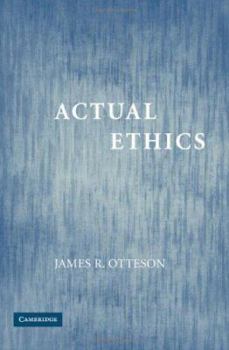Actual Ethics
Select Format
Select Condition 
Book Overview
Actual Ethics offers a moral defense of the 'classical liberal' political tradition and applies it to several of today's vexing moral and political issues. James Otteson argues that a Kantian conception of personhood and an Aristotelian conception of judgment are compatible and even complementary. He shows why they are morally attractive, and perhaps most controversially, when combined, they imply a limited, classical liberal political state. Otteson then addresses several contemporary problems - wealth and poverty, public education, animal welfare, and affirmative action - and shows how each can be plausibly addressed within the Kantian, Aristotelian and classical liberal framework. Written in clear, engaging, and jargon-free prose, Actual Ethics will give students and general audiences an overview of a powerful and rich moral and political tradition that they might not otherwise consider.
Format:Paperback
Language:English
ISBN:0521147093
ISBN13:9780521681254
Release Date:September 2006
Publisher:Cambridge University Press
Length:368 Pages
Weight:1.14 lbs.
Dimensions:0.8" x 6.4" x 9.0"
Customer Reviews
1 rating
An Introduction to Libertarian Political Ethics
Published by Thriftbooks.com User , 16 years ago
According to the first chapter, James Otterson wrote Actual Ethics as something of a counterpoint to Peter Singer's wildly popular and influential Practical Ethics. In Practical Ethics, Singer advocates a very utilitarian approach to ethics that is strongly in favor of income redistribution as a way to shift some wealth from those who have a lot to those who have a little. In Actual Ethics, Otterson starts out with a very different ethical framework - Kantian ethics, where individuals are treated always as ends and never simply as means to other ends - in order to argue that such redistribution violates ethics by seeing some as means to the ends of others. In short, Otterson argues that the most just society is that which leaves everyone free to pursue their own well-being and where the state's only legitimate role is to set up and maintain a system conducive to this individuality. I am going to give this book four stars with some stipulations. The book is a very good indtroduction to a certain type of libertarian ethics. Like Singer's Practical Ethics, this book takes what can be a very complicated and abstruse subject and makes it very accessible. So, as an introduction to ethics (what Otterson intended), the book does a very good job. Otterson presents his case in a very clear way and is always humble about it, keeping in mind that it is his job to persuade rather than accepting it as a given that readers should simply take his lines uncritically. Otterson is obviously well read and each chapter includes, at its end, a helpful list of all sources the chapter used so that interested readers might dig up some good primary sources. As a philosophical work, the book is okay but just okay. Even as a fellow libertarian sympathetic to many of Otterson's conclusions - the abolution of income redistribution, govenrment-funded education, etc. - I found myself sometimes frustrated with Otterson's claims and lack of thoroughness in dealing with possible objections. For instance, I am a bit skeptical of Otterson's central idea that the only just ethic is one which treats all people as ends rather than means. Not that we should not do this, but the very capitalism Otterson defends does not always do this. Employers see employers as means, employees see employers as means, producers see consumers as means (to more revenue) and consumers see producers as means (of getting products and services). The entire process of bargaining (getting the most from the other for as little expenditure as possible) involves seeing the other as a means to get what you want for as little cost as necessary. I could be wrong, but that Otterson did not even entertain this objection floored me. Neither did Otterson consider the idea that "Respecting the individual" (a) may entail more than the negative liberty of leaving her free to make decisions for herself, but (b) may not be a value that overrides all other consdierations in every case. The obvious argument in favor of pu






